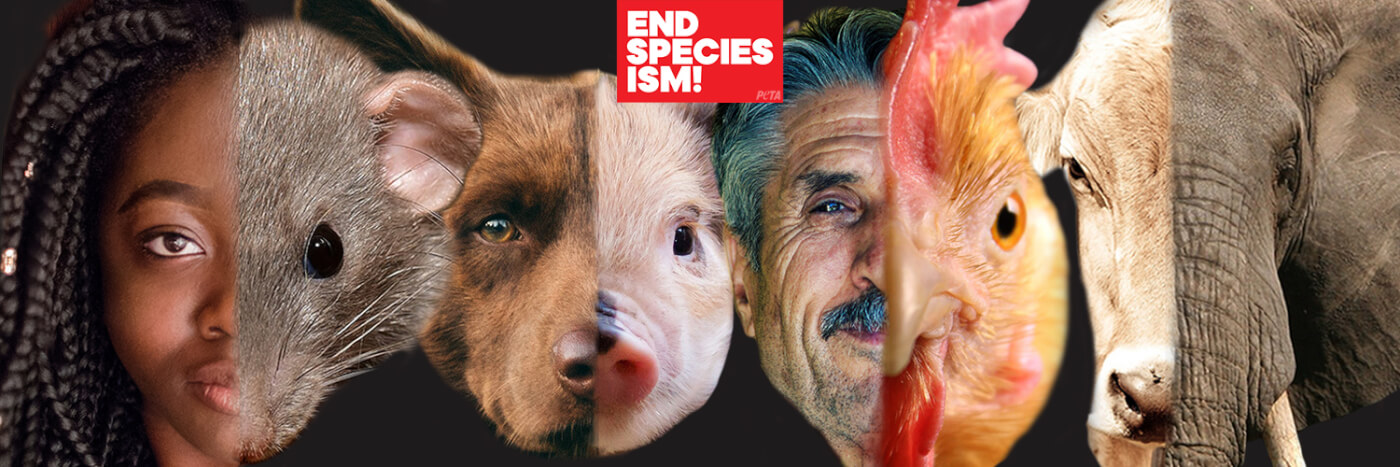What Is Speciesism?
Have you ever wondered how someone can be moved to tears by a news story about an abused dog yet feel no remorse over eating a bucket of chicken legs that caused multiple birds to suffer and die?
The answer is “speciesism”, a misguided belief that one species is more important than another. This toxic mind-set is deeply ingrained in our society, and it results in all kinds of negative consequences.
From the time we are young, most humans are conditioned to view certain species as worthy of care and compassion and others as unworthy – all based on arbitrary human preferences.
If you can’t eat your dog, then why eat a pig? #EndSpeciesism #NotOursToEat pic.twitter.com/IuvbIzoXTN
— PETA India (@PetaIndia) April 20, 2020
Intentionally or not, parents, teachers, the media, and other influences send children the message that puppies and kittens are “friends”, fish and chickens are “food”, and rats and mice are “pests”. Most children are also taught that human desires, needs, and interests, no matter how trivial, always trump those of other species.
As a result, we learn to ignore our own conscience, which tells us that it’s wrong to mistreat others. We convince ourselves that we have the “right” to imprison animals in laboratories, experiment on them, and kill them because it might help humans. We tell ourselves that it’s OK to eat ice cream made from cows’ milk because our desire for dessert outweighs a mother cow’s right to nurse and care for her calf, that it’s OK to steal sheep’s wool for sweaters and scarves and ducks’ feathers for pillows, that keeping fish in small tanks for a decoration and entertainment is acceptable, and that the enjoyment we get from casting a baited hook into the water to catch fish matters more than the pain inflicted on them when they’re pierced through the lip and yanked into an environment in which they can’t breathe. Humans use speciesism to try to justify every kind of cruelty imaginable.
Fish don’t audibly scream when they’re impaled on hooks or grimace when the hooks are ripped from their mouths, but their behavior offers evidence of their suffering—if we’re willing to look.
FISH FEEL PAIN! #EndSpeciesism #NotOursToEat pic.twitter.com/4crWmvYIQt
— PETA India (@PetaIndia) March 22, 2020
All animals deserve equal consideration, regardless of humans’ opinions of them. While most of us have been steeped in speciesism throughout our lives, we can – and must – overcome this destructive way of thinking.
We can start right now by changing how we speak about other species. Animals are thinking, feeling beings – so we shouldn’t refer to them in the same way we refer to inanimate objects like old chairs or boots. Instead of calling an animal “it”, use “he” or “she”.
Rejecting speciesism also means taking an objective look at our personal choices and changing the ones that hurt animals. One of the best places to start is by voicing our disapproval of animal testing by buying only products that aren’t tested on animals. Leaving animal-derived foods off our plates, by going vegan, is also fundamental, and PETA India has plenty of resources to help, including our free vegetarian/vegan starter kit. When we start to view other species as fellow sentient beings and individuals, we won’t want to exploit them for their skin, fur, down, or wool, so we’ll choose animal-free clothing, as well as helping to put an end to zoos and animal circuses.
*****
It’s time to recognise that all living, feeling beings deserve to be treated with respect and compassion. We can reject speciesism and act with integrity and consistency toward all animals, and the first step is to recognise that they have the right to live free from human exploitation.








